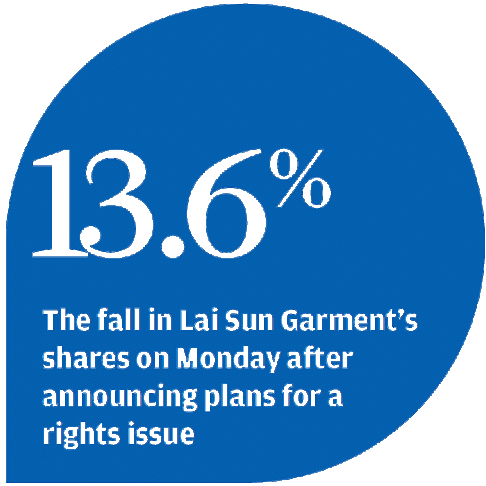
Developers face risks in rights issues
Prospect of costlier funding leaves small firms with few choices, but dilution is a key problem

Small developers run the risk of earnings dilution as rising funding costs may force them to raise money through rights issues, say analysts.

Shares in Wanda Commercial Properties dropped 2.33 per cent on Monday after announcing on Friday plans to raise HK$2.46 billion through a rights issue of three shares for every 10 held by investors. The shares rose 0.62 per cent to end at HK$3.24 yesterday, after a 5.8 per cent fall on Tuesday.
Ding Benxi, chairman of Wanda Commercial, said the money raised would be used for "investing in projects on the mainland and overseas".
Shares in Lai Sun Garment (International), the parent of Lai Sun Development, have also taken a beating since announcing on Friday that it will raise HK$215 million through a rights issue of four shares for every 25 existing ones.
Lai Sun has settled on an issue price of 83.4 HK cents, a 40 per cent discount on its previous close. Its stock plunged 13.6 per cent on Monday, and dropped 3.15 per cent to finish at HK$1.23 yesterday.
"Few major developers have made rights issues in the past. If they want to issue shares, they prefer share placements rather than rights issues as investors do not like the latter," said Johnson Hu, a property analyst at CIMB.
A company would go for a rights issue only when it could not find enough institutional investors for a share placement but still needed the money, he said, indicating why small-cap firms would fall back on this option.
He said funding costs through bond issues faced an upside risk next year but major developers should still be able to raise funds through bonds.
"Developers need to reduce net gearing or raise capital to increase their land bank. We found that the total land purchased by developers in our research coverage in the first 11 months of this year was 90 per cent higher than for the entire 2012," said Hu.
However, Alan Jin, a property analyst at Mizuho Securities, said bond financing was still the preferred tool of financing in general.
"If the cost of debt financing becomes more expensive, developers will naturally shift from debt financing to equity financing. We think there are greater chances for gradual increases in funding costs in both domestic and overseas markets in 2014," he said.
Chew Fook Aun, deputy chairman of Lai Sun Garment, said the firm chose a rights issue because bank loans were not a good option as that would further increase the company's gearing ratio, which now stands at 36 per cent. Nor was the company well placed to tap the bond market because of the small size of its business, he said.